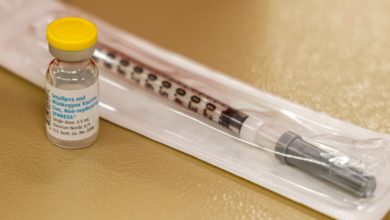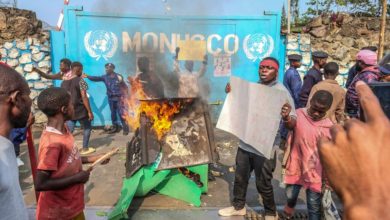The Growing Pains of Kyiv’s Youth Captured in Photos

If age is cumulative, the tallying up of events that weather the body and shape the mind, then Ukraine may not have many young people left.
Few here are unscarred by Russian President Vladimir Putin’s full-scale invasion of Ukraine on Feb. 24, which plunged millions of children and adolescents into a warped reality of curfews and roadblocks, mortar fire, and shallow graves. Soldiers on the front line risk their lives to ensure that children can have freedoms they don’t feel guilty about.
German photographer Fabian Ritter spent three weeks profiling young people in Kyiv Oblast, the province surrounding Ukraine’s capital, even sharing an apartment with some to better understand their perspectives. “Some part of their youth definitely got stolen,” Ritter tells TIME. “They all speak very seriously and very grownup about this war and what they hope for.”

After a lengthy pause, the first concert with local bands was finally held.
Fabian Ritter—DOCKS Collective

After a three-month closure, skateboarders were able to return to the Kyiv Opera House in May. The monument is protected by panels and sandbags from potential air attacks.
Fabian Ritter—DOCKS Collective

Following an art auction that raised funds for the Ukrainian military, young people gathered in a park.
Fabian Ritter—DOCKS Collective

Actors with the Kyiv Improvisational Theater take a break for two months to rehearse, and then prepare for their performance in June.
Fabian Ritter—DOCKS Collective
Youth should be a time for adventure and exploration, to unfurl the coddled layers of childhood and discover one’s inner self, before family and career take priority. This self-discovery in Ukraine has been imprinted by the struggle for national survival.
“I met many people who may not have had a strong Ukrainian identity before, but feel more Ukrainian since the start of the war,” says Ritter. “Some told me they always wanted to travel the world, but now feel they really need to be here and to play a role in this war, even if it’s a small role.”
Continue reading: Rock Star Poet Performing Concerts for Ukrainians Underground from Russian Bombs
As fighting has receded from Kyiv to Ukraine’s southern and eastern regions, young people in the capital are caught between war and a veneer of normality, not knowing the right way to behave. Jungle gyms have been made out of routed Russian tanks for the young. The dance clubs for teens and young adults have been reopened, but very few people attend. Funds are also collected by music venues for military personnel. “No one really feels like partying,” says Ritter.

The children still play in the abandoned buildings behind them.
Fabian Ritter—DOCKS Collective

Ksenia takes a picture in Shevchenko park. She’s grateful to be able to still live in Kyiv.
Fabian Ritter—DOCKS Collective

Unscathed car in the vicinity of Makariw (Kyiv Oblast).
Fabian Ritter—DOCKS Collective

Borys and Grisha, close friends, pose for a picture at a lake. Grisha lost his Irpin house within hours and was overthrown by Russian soldiers.
Fabian Ritter—DOCKS Collective
Kyiv’s youth find themselves in the third of, they hope, four stages of this national catastrophe. The war started with the preparations, followed by the Russian invasion of Kyiv. Now, the youth are in a dark purgatory and dreaming about the next stage. “Until the day of victory, most of them don’t make long-term plans,” says Ritter. “They are just trying to get through this stage now.”
Many young people are taking any job they can to feed their families and put off studying. People who are aspiring to work in theater or the arts will be especially affected by this. Opportunities were previously cut off due to the COVID-19 pandemic. Many musicians are aspiring to be professional musicians. Ritter also captured LGBTQ+ teens trying to find a way to connect their inchoate identities with the national identity under threat.
Ritter’s favorite shot is the one that features two friends aged 15 swimming in a lake near Bucha (now a symbol of Russian war crimes). The first day that they met was after the war. It was a return to a routine pastime set against an evil backdrop. “Their parents tried to protect them from what they could have possibly seen,” says Ritter, “but they definitely heard explosions and things.”
Yet it’s ultimately impossible to shield Kyiv’s youth from the prospect that fighting may one day return, that it will be their turn next to pick up a gun. “Some of the young people were quite afraid,” says Ritter, “thinking maybe one day that they will have to fight, too.”

A jam session at the arts center “The Pink Punk Art Studio“.
Fabian Ritter—DOCKS Collective

Maks is a musician who says it’s difficult to find a job permanent in Kyiv.
Fabian Ritter—DOCKS Collective

Sasha lived with his family in Dymer, northern Kyiv during the Russian occupation of the area for the first week of war. Sasha now lives in Kyiv, in a share apartment.
Fabian Ritter—DOCKS Collective

An informal group meets on the rooftop terrace at the “Pink Punk Art Studio.”
Fabian Ritter—DOCKS Collective

Young people from Bucha and Irpin go swimming in the lake close to Kyiv.
Fabian Ritter—DOCKS Collective
Read More From Time





